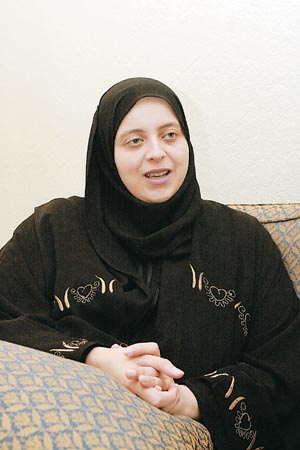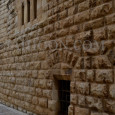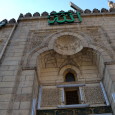[Actress finds peace in the Holy Book by By Bassma Al Jandaly | 18-11-2002]
Beaming a broad, infectious smile, Abeer Al Sherqawi is eager to impart her newfound inner peace and serenity after rediscovering the Holy Quran.
The 32-year-old Egyptian screen siren, who used to wear skimpy outfits in the heyday of her career, recently came to Dubai to attend the sixth Dubai International Holy Quran Award and to deliver lectures about Islam.
It was Abeer’s childhood dream to become an actress. Her father, Galal Al Sherqawi, is one of Cairo’s leading TV and movie producers.
A fixture in Egyptian film circles, Abeer made some scathing remarks about Egyptian media. “The Egyptian media do not accurately reflect ordinary life in Egypt. It glosses over many facts. Some 90 per cent of Egyptian women wear the hijab,” she said.
Abeer’s younger brother, 30-year-old Tamir, studied commerce, but is also gravitating towards show business. “I guess show business is part of our family,” explained Abeer.
“But music and other forms of media affect the new generation too much. The new generation has no role models to follow other than what is being offered by the Internet, and satellite TV – which promote all sorts of undesirable things.”
The result – they waste their lives on trivial things, she said.
“The new media, which is patently Western, have encroached into our culture. The young generation is encouraged to be aimless. They lose touch with reality and they become useless to their country and their families,” she lamented.
The holy month of Ramadan is a period of worship and devotion, but unfortunately, film producers and those working in the Egyptian media bombard the audience with popular movies, TV series and other entertainment programmes, according to Abeer.
“It is a deliberate attempt to draw the attention of people away from the message and essence of the holy month,” she criticised.
About her own career as a film actress, Abeer remarked: “At that time, my work put too much pressure on me. Competition is strong, and it’s done in a vicious way. The strong gobble up the weak. To be an actress and get good roles, you have to use sneaky, underhanded ways, or whatever it takes.”
Abeer believes that the depiction of men and women freely interacting onscreen destroys “part of us, and our religion”.
In the constant tussle between her conscience and the world she was living in, Abeer was driven to the brink of insanity. “I had to consult a psychiatrist. The doctor made things easier for me and made me feel that what I was doing was not wrong,” she recalled.
“I adored him. I think he abused his position of strength over my frail mind. He misused his profession and made me fall in love with him. I married him after a whirlwind romance.”
Abeer later realised the relationship was doomed from the start. Her parents were against it, and problems gradually went from bad to worse.
“After a year, just two months after our baby was born, we filed for divorce,” she said. “After that, I started looking for a peaceful mind and heart. I couldn’t find it. The only place I could find it was in the Holy Quran.”
Abeer read it and tried to understand it.
“Now here I am. I feel whole again. I have given up the kind of life I used to live. It’s as if I were born again, clean and pure. I realised that it’s never too late to change,” she said.
Abeer urges parents to keep an eye on their children. “I have a dream for my son and for all the new generation to get themselves immersed in our religion,” she said.
She and her son now live with her parents, away from the world of make-believe. She plans to spend some time studying the Holy Quran and teach her son Galal.
She finds it a little difficult because her mother prefers to listen to modern Arabic music about romantic love. “That sort of thing affects my son,” she bemoaned.
“After some time, I plan to start looking for a job, maybe as a TV producer. But I have doubts that anyone will accept me, because they avoid women who wear the hijab on Egyptian TV.”
Abeer, however, intends to persevere and find a job suitable for her, perhaps in theatre production for children and women. “I prefer productions that would send the message of Islam,” she said.
“It may be difficult for me to lead this kind of life. But it’s never too late to give it a try.” She admits it was difficult for her to give up the life she led as a movie star. “There were volcanoes in my heart. But the fire inside me has cooled down. It is a new life that I chose.”
Abeer does see a positive trend in Egypt today where young girls are donning the hijab. She stressed that Islamic societies, with their long history, must not succumb to the products of America.
Abeer grew up in such an atmosphere, which affected her outlook, she explained. As a result, she developed a desire to enter the world of show business. She studied acting and theatre at the American University in Cairo.
“If my father had had another job, I don’t think I’d have gone into acting. Children are a product of the atmosphere they grow up in. I have my own son. He is two years old. I try to detach him from TV, music and film. I don’t want him to be spoiled,” she said.
Modern media can penetrate the mind of a child more aggressively than the Holy Quran, she said. She believes it is the responsibility of parents to prevent their children from becoming slaves to pop culture.
Abeer revealed that she is planning to marry again and to have more children. “There is a man who has asked me to marry him and I am thinking over it seriously. If he is suitable, I will go ahead with it.”



